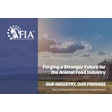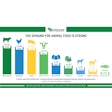
Clean Fuels Alliance America submitted a detailed technical response to the U.S. Department of Agriculture’s (USDA) Request for Information on climate smart agriculture practices for biofuel feedstocks. Clean Fuels emphasized the urgent need for immediate guidance to ensure biodiesel, renewable diesel, and sustainable aviation fuel producers, along with their farmer partners, are prepared for the §45Z Clean Fuel Production Credit set to take effect in January 2025.
“We appreciate that Secretary Vilsack understands the importance of having guidance for the §45Z Clean Fuel Production credit well in advance of January 1, 2025, so farmers, producers, and fuel customers have the certainty to continue to produce and use low-carbon biomass-based diesel,” Clean Fuels stated in their submission. “To set a practice-based crediting program up for success, farmers must know the credit value as soon as possible to help them assess what land management practices to employ as they make both planting and harvesting decisions ahead of the season.”
Clean Fuels recommended that USDA extend its analysis of climate smart agriculture practices to winter annual oilseeds and all feedstocks with approved pathways under the Renewable Fuel Standard (RFS). Additionally, they suggested that USDA consider other practices defined by the USDA’s Natural Resources Conservation Service and create regional, practice-based carbon intensity credit tables using the Economic Research Service’s (ERS) Farm Resource Regions.
Kurt Kovarik, Vice President of Federal Affairs for Clean Fuels, stressed the immediate need for policy certainty. “U.S. biodiesel, renewable diesel, and sustainable aviation fuel producers are already annually producing nearly 5 billion gallons of advanced biofuels that could qualify for the credit. They need policy certainty immediately to make the transition to the producer credit and maintain growth in the industry. Moreover, farmers producing biofuel feedstocks need to make decisions now to use climate smart farm practices next year and document the added value for the credit.”
The USDA’s analysis of climate smart agriculture practices is anticipated to have significant implications beyond the §45Z Clean Fuel Production Credit. The Clean Fuels Alliance America’s response highlights the critical need for timely guidance to facilitate a smooth transition and continued growth in the biofuels industry.

















